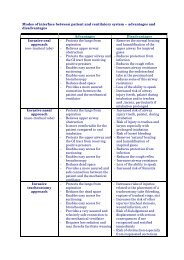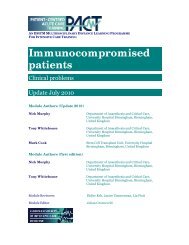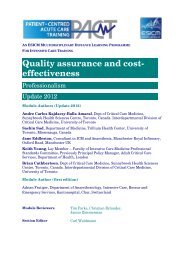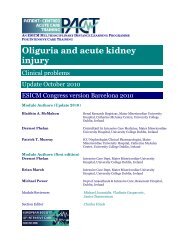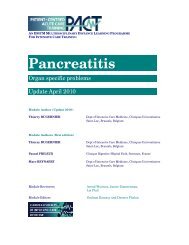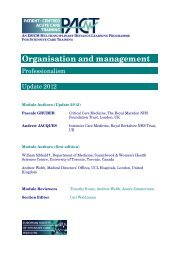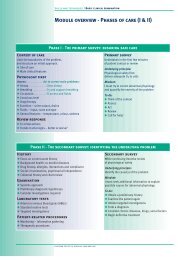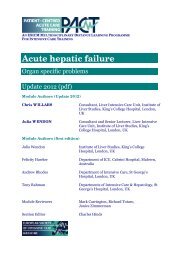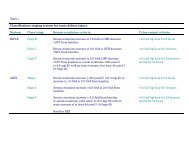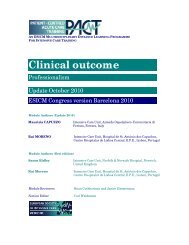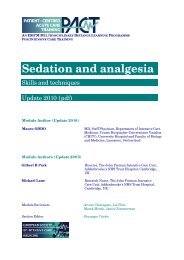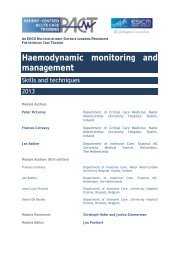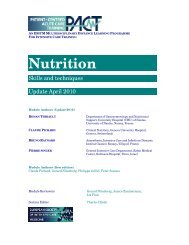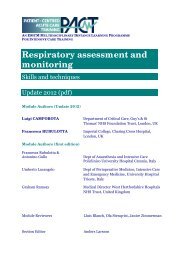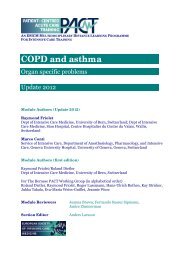Burns injury - PACT - ESICM
Burns injury - PACT - ESICM
Burns injury - PACT - ESICM
Create successful ePaper yourself
Turn your PDF publications into a flip-book with our unique Google optimized e-Paper software.
performed in this setting. If prognosis appears poor and palliation seems to be the<br />
best choice after an overall evaluation, the decision to terminate active treatment<br />
should be made as early as possible in the treatment course.<br />
For further reading see the <strong>PACT</strong> modules on Ethics and Communication.<br />
Cole P, Stal D, Hollier L. Ethical considerations in burn management. J<br />
Craniofac Surg 2008; 19(4): 895–898. PMID 18650707<br />
Young AE. The Laing essay 1998: ethical issues in burn care. <strong>Burns</strong> 1999; 25(3):<br />
193–206. PMID 10323603<br />
Platt AJ, Phipps AR, Judkins K. Is there still a place for comfort care in severe<br />
burns? <strong>Burns</strong> 1998; 24(8): 754–756. PMID 9915678<br />
Burn care research<br />
Although the research activities have increased in the burn care community<br />
throughout the years, a significant portion of usual burn care practices still lack a<br />
strong scientific basis. Despite this, mortality has decreased significantly, length of<br />
stay has dramatically been shortened and long-term outcome assessed as health<br />
related quality of life has improved. However, mainstream burn care does still not<br />
fulfill the highest evidence-based medicine (EBM) criteria. At the same time, it is<br />
important to realise that a significant amount of knowledge used in burn care and<br />
other care specialties, especially trauma and critical care, are based on early<br />
experiences in the care of the burn injured. This applies especially to fluid therapy,<br />
knowledge on the trauma response and the complications in the post trauma care<br />
period and the nutritional support. Lately, important research within burn care has<br />
been conducted in the field of modification to the trauma response - such as<br />
pharmacological modulation of this specific trauma response.<br />
Within the burns specialty, the focus is now directed at improving research quality<br />
and there is a strong demand for more randomised controlled trials supporting<br />
present care and identifying better care strategies.<br />
http://www.elsevier.com/wps/find/journaldescription.cws_home/30394/description<br />
#description) and the journal of Burn Care Research<br />
http://journals.lww.com/burncareresearch/pages/default.aspx<br />
Herndon DN, Hart DW, Wolf SE, Chinkes DL, Wolfe RR. Reversal of catabolism<br />
by beta-blockade after severe burns. N Engl J Med 2001; 345(17): 1223–<br />
1229. PMID 11680441<br />
Herndon DN, Tompkins RG. Support of the metabolic response to burn <strong>injury</strong>.<br />
Lancet 2004; 363(9424): 1895–1902. PMID 15183630<br />
Jeschke MG, Kulp GA, Kraft R, Finnerty CC, Mlcak R, Lee JO, et al. Intensive<br />
insulin therapy in severely burned pediatric patients: a prospective<br />
randomized trial. Am J Respir Crit Care Med 2010; 182(3): 351–359. PMID<br />
20395554<br />
46



